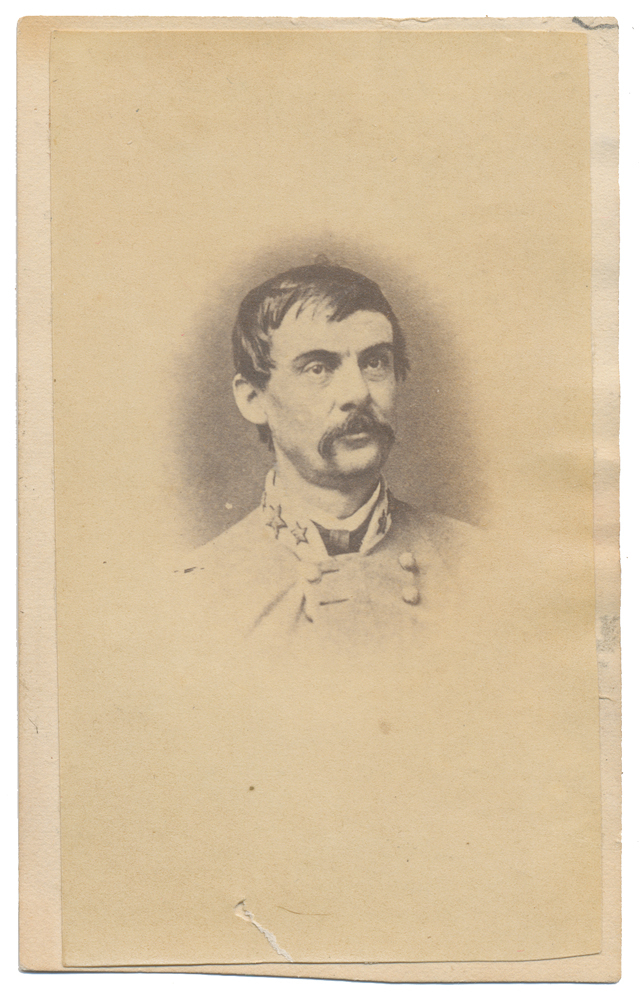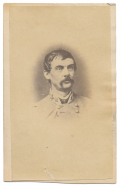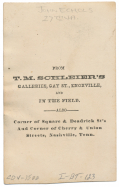site search
online catalog
BUST VIEW OF GENERAL JOHN ECHOLS WITH A TENNESSEE PHOTOGRAPHER’S IMPRINT

$500.00 SOLD
Quantity Available: None
Item Code: 1138-123
Vignette view of Echols in a double-breasted frockcoat with colonel’s insignia on the collar.
Contrast and clarity are good. Mount s good. Bottom center of paper has a small tear.
Reverse has a photographer’s imprint for T. M. SCHLEIER’S… KNOXVILLE AND IN THE FIELD…
Image is from the collection of the late William A. Turner
John Echols was born March 20, 1823, at Lynchburg, Virginia and was educated at the Virginia Military Institute, Washington College and Harvard College. Entering upon the practice of law at Staunton he soon attained distinction.
He was a man of magnificent figure, standing 6 feet 4 inches, and his mental qualities fully sustained his physical capacity for leadership. After taking a prominent part in the Virginia convention of 1861, he offered his military services, and was promptly commissioned lieutenant-colonel, and ordered by General Lee to call out and muster in the volunteer forces in the vicinity of Staunton, including the mountain counties, for Johnston's army.
This work done he was assigned to the Twenty-seventh regiment, which he commanded at First Manassas, where he had a gallant part in earning the title of the "Stonewall Brigade." He was soon afterward promoted colonel, and in this rank served with Stonewall Jackson in the Shenandoah Valley through the winter and spring of 1861-62.
In Jackson's report of the battle of Kernstown he related that "Col. John Echols with his regiment, with skirmishers thrown forward, kept in advance and opened the infantry engagement, in which it was supported by the Twenty-first. Well did these two regiments do their duty, driving back the enemy twice in quick succession. Soon a severe wound compelled the noble leader of the Twenty-seventh to leave the field. "
This wound, received March 23rd, disabled him for some time. His gallantry was recognized by promotion to brigadier-general in April, 1862, and a few months later he was assigned to command of a brigade of the army of Western Virginia, with which he was afterward prominently identified.
He participated as a brigade commander in Loring's occupation of the Kanawha Valley in September, and after Loring had withdrawn to the mountains, Echols was assigned to the command of the army of the Department of Western Virginia, superseding Loring.
He promptly reoccupied Charleston, but was again compelled to retire before superior forces. He resigned his department command in the spring of 1863, and during the following summer served upon the court of inquiry held at Richmond to investigate the cause of the fall of Vicksburg, Gens. Howell Cobb and Robert Ransom being the other members.
Later in the year he commanded the Confederate forces in the battle of Droop Mountain, West Virginia, a hard-fought contest, in which his command, though forced to retire, gave an effectual check to the Federal plans. In May, 1864, he commanded Breckinridge's right wing at the successful battle of New Market, in the Valley, and was then called with his brigade to Lee's army on the Cold Harbor line, where he served with credit.
On August 22, 1864, he was given charge of the district of Southwestern Virginia, and on March 29, 1865, was ordered to the command of the Western Department of Virginia, relieving General Breckinridge. On April 2nd he began a march to unite with Lee, and reached Christiansburg on the 10th, where he received a telegram announcing the surrender at Appomattox.
It was a terrible blow to his little army of 6,000 or 7,000 men, and caused indescribable consternation. At a council of war it was determined to march to unite with Johnston's army, and Echols set out at the head of Vaughn's and Duke's brigades on the 11th.
Subsequently he accompanied President Davis to Augusta, GA, and was for a short time in command at that place.
After the close of hostilities, he re-entered the law practice at Staunton, also exerted a beneficent influence in public affairs as a member of the committee of nine, in restoring Virginia to its proper relations with the general government, and as a member of the Virginia legislature.
He was one of the early members of Stonewall Jackson Camp, Confederate Veterans, at Staunton, and was always faithful to the soldiers of the Confederacy. He was very successful both in law and in business, displaying great executive ability; became president of the Staunton National Valley Bank, and receiver and general manager of the Chesapeake, Ohio & Southwestern Railroad.
The duties of the latter office required his residence in Kentucky during the last ten years of his life. He was twice married, first to a sister of Senator Allen T. Caperton, of West Virginia, and after her death to Mrs. Mary Cochrane Reid, of New York.
He died at the residence of his son, State Senator Edward Echols, at Staunton, May 24, 1896. He is buried in Thornrose Cemetery, Staunton, Virginia. [ad] [ph:L]
~~~~~~~~~~~~~~~~~~~~~~~~~~~~~~~~~~~
THIS ITEM, AS WITH ALL OTHER ITEMS AVAILABLE ON OUR WEB SITE,
MAY BE PURCHASED THROUGH OUR LAYAWAY PROGRAM.
CLICK HERE FOR OUR POLICIES AND TERMS.
THANK YOU!
Inquire About BUST VIEW OF GENERAL JOHN ECHOLS WITH A TENNESSEE PHOTOGRAPHER’S IMPRINT
For inquiries, please email us at [email protected]
Most Popular
Historical Firearms Stolen From The National Civil War Museum In Harrisburg, Pa »
Theft From Gravesite Of Gen. John Reynolds »
Cavalry Carbine Sling Swivel »
Fine Condition Brass Infantry Bugle Insignia »
featured item
VERY ATTRACTIVE DOUBLE CASED SIXTH-PLATE AMBROTYPES OF CIVILIAN AND CONFEDERATE SOLDIER IN A RARE UNION CASE
The relationship between the two men pictured is not known but no doubt they are either brothers or the same man at different points in his life. The left side ambrotype is of a seated man sporting a closely trimmed beard and mustache wearing a dark… (1138-1975). Learn More »




